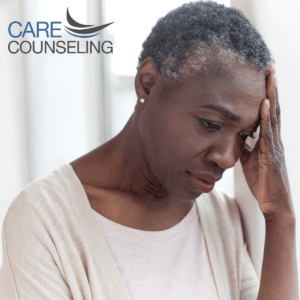 According to the National Institute of Mental Health, nearly 1 in 5 adults live with mental-illness. While the rates for mental health are similar for all adults, there are unique differences that impact women-patients across all cultural and socioeconomic backgrounds such as depression, anxiety, trauma, and eating disorders.
According to the National Institute of Mental Health, nearly 1 in 5 adults live with mental-illness. While the rates for mental health are similar for all adults, there are unique differences that impact women-patients across all cultural and socioeconomic backgrounds such as depression, anxiety, trauma, and eating disorders.
Women and Mental Health
Source: World Health Organization, Center for Disease Control, & National Institute of Mental Health
Depression and Anxiety
• Depression is 2Xs more common in women than in men.
• Generalized anxiety is also 2Xs more likely in women.
• Depression, posttraumatic stress disorder, anxiety, and suicidal ideation are common among women who have experienced physical, sexual, and other forms of violence.
Eating Disorders
• A lifetime prevalence of anorexia nervosa was 3Xs higher in women.
• Binge eating disorder was 2Xs as high.
• Prevalence of bulimia nervosa was 5Xs higher in women.
• Teens and young adult women are especially at risk of developing an eating disorder.
Hormonal Changes
• Mental health symptoms can be triggered by hormonal changes such as depression during pregnancy, postpartum, menstruation, or perimenopause.
• Approximately 1 in 8 women in the US experience symptoms of postpartum depression; in some states this is as high as 1 in 5 women.
Rape, Sexual Assault, and Violence
• 91% of rape and sexual assault victims in the US are women.
• Nearly 1 in 5 women will experience rape or attempted rape in their lifetime.
• Neary 1 in 4 women have experienced severe physical violence from an intimate partner in their lifetime.
• 1 in 3 women globally experience violence.
Objectification, Harassment, and Microaggression
• Objectification of girls/ women, sexual harassment, and repeated microaggressions can lead to violence and negatively impact mental health including self-esteem.
Risk factors for women include inequalities in socioeconomic status including low income/ social status, experience of gender-based violence, and being a primary caretaker. Historically, women in the US have been denied opportunities based on gender as well as individuals and women within the LGBTQIA+ and BIPOC community. It can feel empowering to talk to another female about these concerns within the safety of a therapeutic relationship. While you and your therapist may not share the exact lived experience, there is power in bearing witness to one’s story—the beauty and the pain.
For online resources specific to mental health for women, check out the Massachusetts General Hospital (MGH) Center for Women’s Mental Health Productive Psychiatry Resource Information Center. https://womensmentalhealth.org/resource/
Written By: Charlotte Johnson, MA, LPCC
We’re Here to help
Our wellness experts will be happy to take care of you. You can CLICK HERE to schedule an appointment now or call (612)223-8898.
Meet Clinicians
We’re united by our commitment to providing effective, relevant, and innovative mental health support at all stages of your journey. Click Here to find out more about who we are, where we come from, and how we live out CARE’s mission every day.
The professionals at CARE are actively collecting and creating resources to help with what you need. We’re Here for You.



